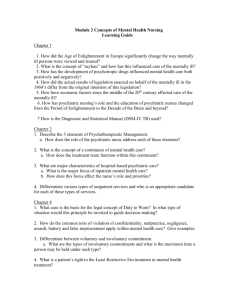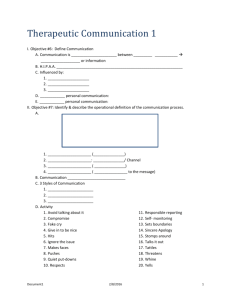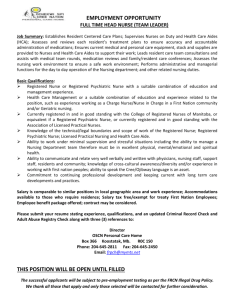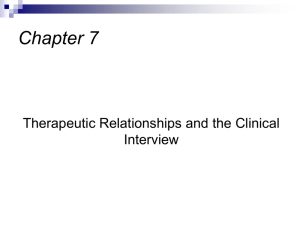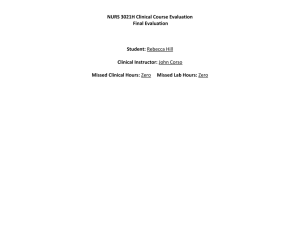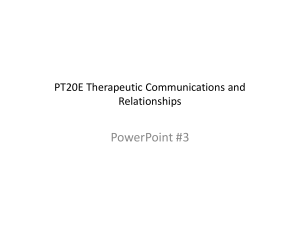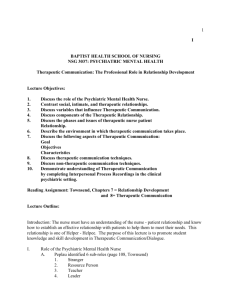Concepts of Psychiatric Nursing
advertisement
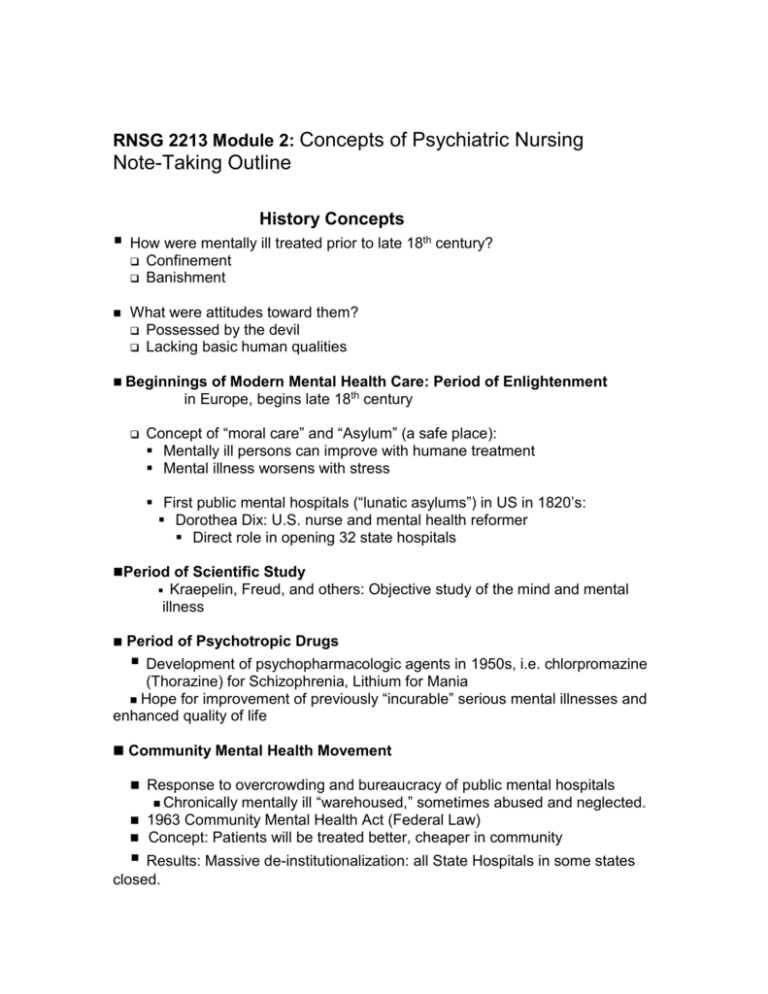
RNSG 2213 Module 2: Concepts of Psychiatric Nursing Note-Taking Outline History Concepts How were mentally ill treated prior to late 18th century? Confinement Banishment What were attitudes toward them? Possessed by the devil Lacking basic human qualities Beginnings of Modern Mental Health Care: Period of Enlightenment in Europe, begins late 18th century Concept of “moral care” and “Asylum” (a safe place): Mentally ill persons can improve with humane treatment Mental illness worsens with stress First public mental hospitals (“lunatic asylums”) in US in 1820’s: Dorothea Dix: U.S. nurse and mental health reformer Direct role in opening 32 state hospitals Period of Scientific Study Kraepelin, Freud, and others: Objective study of the mind and mental illness Period of Psychotropic Drugs Development of psychopharmacologic agents in 1950s, i.e. chlorpromazine (Thorazine) for Schizophrenia, Lithium for Mania Hope for improvement of previously “incurable” serious mental illnesses and enhanced quality of life Community Mental Health Movement Response to overcrowding and bureaucracy of public mental hospitals Chronically mentally ill “warehoused,” sometimes abused and neglected. 1963 Community Mental Health Act (Federal Law) Concept: Patients will be treated better, cheaper in community Results: Massive de-institutionalization: all State Hospitals in some states closed. Results: increased acuity and strain on emergency services, increased number of homeless mentally ill 1990’s “Decade of the Brain” Advances in brain research, imaging Focus on Biological basis of mental disorders And Beyond . . . Evidence-based practice Mental Illnesses have multiple etiologies New drugs-fine tuning Developing a continuum of care The Wellness Paradigm and Recovery model Ethical and Legal Aspects of Mental Health Care Ethical Social and cultural values Individual Freedom Paternalism vs. Libertarianism Paternalism believes that an authority knows what is best for you Libertarianism believes that the individual knows what is best for them Material Resources Stigma of mental illness: where does it come from? Legal Nurses Need to Know About: How to adapt legal principles to mental health settings Safeguarding nursing practice from charges of negligence, false Imprisonment, assault or battery, etc. “DUTY TO WARN” Mental health professionals must warn others of a client’s threat of suicide or of harm to self or others Rights of Psychiatric/Mental Health Patients Right to refuse treatment Right to informed consent (and to be informed of rights) Right to confidentiality: increased protection for persons Right to receive visitors and telephone calls Right to be treated with respect Right to be treated in the least restrictive environment Concept of Least Restrictive Environment: Should guide nursing decisions receiving MH tx Seclusion is used when the person is a danger to others Restraint is used when the person is a danger to self Never used to get a patient to comply Basic Needs Must Be Met Warmth, food, access to outdoors DO NOT have right to all possessions Legal: Commitment for Mental Health Treatment (As Applied Under Texas Law) Must have a mental illness as defined by the Texas Mental Health Code: “Mental illness is a disease or condition which either: Substantially impairs the person’s thought, perception of reality, emotional process and/or Grossly impairs behavior as manifested by a recent event of disturbed behavior (“Gravely Disabled”) Types of Admissions/Commitments Voluntary Admission/Commitment 16 years of age or over may sign self in for admission. Signs consent for treatment, including each psychotropic medication RX’d. Refusal to sign these consents means medications can NOT be administered 4 Hour Rule: If a patient changes their mind about being in the hospital, may request D/C. Psychiatrist has 4 hours to file for involuntary commitment if pt. needs continued hospitalization. Involuntary Commitments 1)Emergency Mental Illness Commitment aka “Emergency Detention” Allows Mental Health Deputies (Crisis Intervention Team) to pick up a person who presents an “IMMINENT DANGER TO SELF OR OTHERS” and is “Gravely Disabled” and bring them into custody for 24 HOURS to be evaluated 2) Order of Protective Custody (OPC) To involuntarily commit a person, physician must file medical certificate with county clerk which states that the physician has examined the patient within 24 hours. Person now entitled to go before a judge Probable Cause Hearing within 72 hrs. after OPC filed Commitment for up to 14 days 3) Temporary Commitment : for up to 90 days Process initiated when pt. requires extension of inpatient tx. Papers must be filed with court Hearing before a judge with physician and patient present Must prove “Danger to self or others” or meets the deterioration standard In this phase pt. can receive Court Ordered Medications (COM) = scheduled medications administered without pt.’s written consent May be discharged earlier than 90 days if pt. is ready 4) Outpatient Commitment also an option I 5) Extended Mental Health Commitment: up to 1 year Very strong evidence needed -------------------------------------------Last but not least: All commitments discussed can apply to Chemical Dependency - --------------------------------------------- Mental Health Treatment and the Continuum of Care How do individuals enter the mental health system? What are main goals of inpatient (hospital based) mental health care? What are treatment setting options for someone with mental illness? Psychotherapeutic Management and the Role of the Psychiatric-Mental Health Nurse TOOLS ARE: “SELF DRUGS ENVIRONMENT” Therapeutic Use of SELF (Therapeutic relationship) DRUGS: Psychopharmacology ENVIRONMENT: Therapeutic Milieu Mental Health Team: Psychiatrist Nursing staff: includes licensed nurse, tech Psychiatric Social Worker Psychologist Therapeutic Recreation and Expressive Arts personnel Client and Family Other: Peer support counselor, substance abuse counselor, employment specialist, dietician, etc. Therapeutic Nurse/Client Relationship in Psychiatric-Mental Health The therapeutic relationship is the most important component of psychotherapeutic management (paraphrasing Hildegard Peplau) Is a partnership “Therapeutic Alliance” Emphasis on self-care and responsibility Collaboration (to extent possible) in decision-making Holistic View: treats body, mind, spirit uniqueness of each individual Individual seen in context of family and community Inpatient settings: includes the patient community Guided by ANA standards of practice Uses nursing process How is the nurse-patient relationship different than a friendship? How does the psychiatric nurse’s relationship with the patient differ from providing traditional psychotherapy? Goals of the 3 Stages (Phases) of Nurse-Patient Relationship in Psychiatric-Mental Health Nursing Orientation Stage Goals Establishing TRUST Initial assessment Setting boundaries Offering self and support `Nurse examines own feelings; clarifies issues of self-disclosure Working Stage Goals Problem identification: client shares concerns Identifying options, Promoting support for change Providing education: illness, medications, coping and recovery (Patient may move into this phase immediately or not at all. Why?) Termination Stage Goals Summarizing and reflecting on progress Assessing future needs and making referrals Acknowledging end of relationship (Patient may ignore event altogether. Why?) Issues in the Nurse-Patient Relationship Managing Difficult Patient Behaviors May include aggression, self-harming, manipulation, non-reality-based behavior, suspiciousness, problems with communication, lack of cooperation, etc. Dealing with Transference Emotional reactions by the patient toward the nurse that are actually based on previous experiences and relationships Usually manifested as strongly positive or negative pt. overreactions Recognizing Countertransference Inappropriate emotional overreaction by nurse Reaction is based on nurse’s previous personal experiences May be in response to the patient’s transference May interfere with nurse’s ability to be therapeutic Alcoholism/drug use and other types of abusive behavior can cause strong feelings/reactions in nurses. Rescue Fantasy Belief that you are responsible for “fixing” the patient How can we, as helpers, best address these issues? Knowledge Realistic expectations Empathy and acceptance Using clinical supervision
